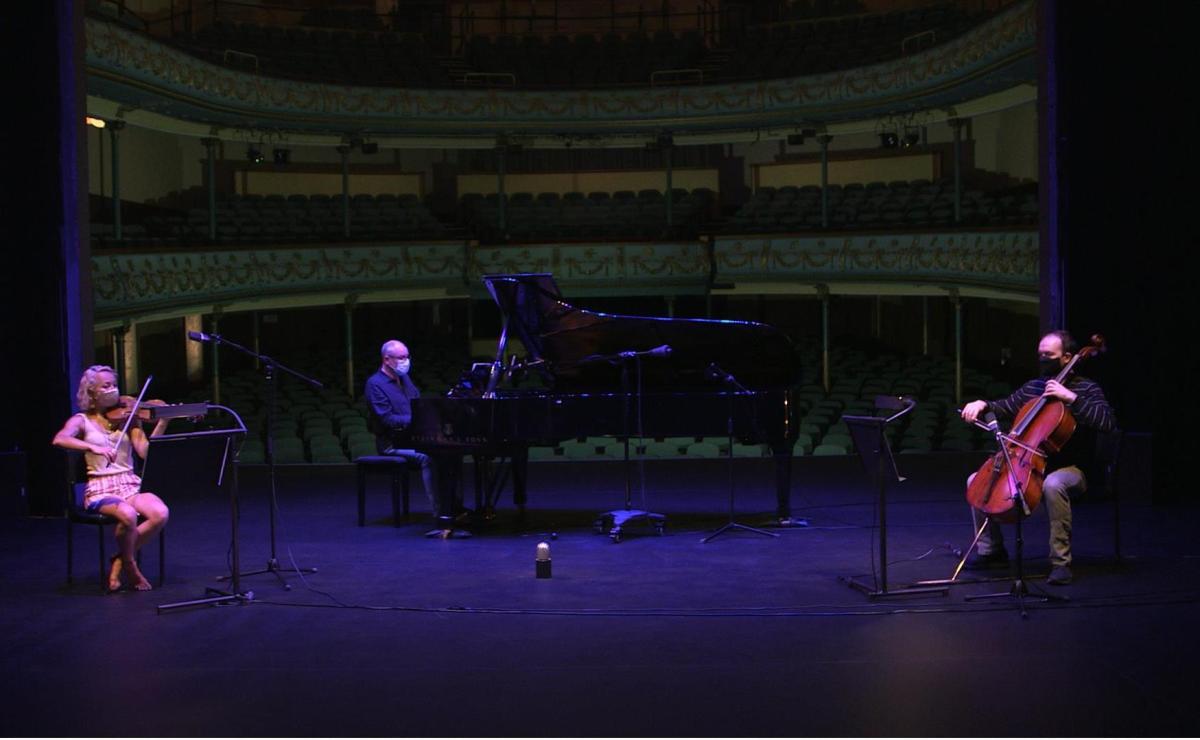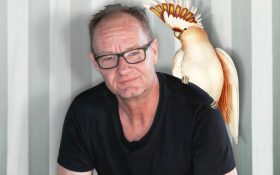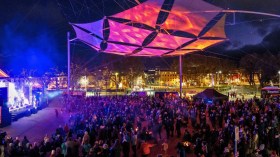


[theme music]
George Dunford: Welcome to the ArtsHubbub, a regular look inside Australian arts – and artists. I’m your host, George Dunford.[Intro Hiraeth I with Rick’s conversation introduced over it]
Rick Chew: So the notion of a place that you’re longing for that may not have existed in the first place, but you’re quite away from it. [And] That got me thinking about the ghost light, the light that is left on in a theatre, when the theatre is dark. And of course, we had this long silence of, of 2020 when theatres were closed across the world, but the notion of actually creating music for the ghosts, so having this beautiful theatre as a backdrop, performing onstage, and actually, you know, also recording in a theatre, which is very different from a recording studio… GD: That’s Associate Professor Rick Chew talking about and playing his work Hiraeth in the deserted Her Majesty’s Theatre in Ballarat. This month, in a special edition of the ArtsHubbub supported by Federation University, we talk to Rick about art, teaching and what we can learn from that ‘long silence’ of 2020. [Music fades but continues underneath] GD: Before coming to lead the Arts Academy at Federation University, Rick had a long career as a composer and academic, but he began his own education as a singer. RC: I have been a professional artist for many years and trained at the Royal College of Music in London, as a singer, as a classical singer. But really, what happened from then on was really quite interesting because I, I got involved with a lot of premieres of new works as an opera singer and as a classical singer. So that, you know, that was really fascinating to see composers and writers going through the process of making a piece and actually being a sort of fly on the wall in those scenarios… GD: As with many careers in the arts, Rick’s career progression wasn’t straight-forward; he looked at several different artforms before finding his way to music. RC: Well, initially, it was, it was a decision between music and visual art. So I had to make that, that choice. And I think I made the right choice. But it’s not that the visual art hasn’t been important to me ever since, you know, I often think in terms of imagining events, when I’m composing a piece of music, you know, it’s not so much about the sound as the whole event. And that’s a very practical way of thinking too, you know, what are the underlying consequences of that event, as well, how as music intersect with society? What are the kinds of questions we’re trying to deal with? That are not to do necessarily with the abstract realm of the sound itself. But it’s a way of bringing people into the room. And I think that that’s really always been fascinating to me. So my career’s really meandered. And the interesting thing was that I realised now that being in the room with other people who were making things, and dealing with those challenges, was was a key factor in that, that I felt that in talking to them, that – and you know, meeting with them, learning from them on the job – you know, I’m I was a singer in some of these environments. So I had a particular function. But it led to actually creating in my own way… GD: Rick saw success as a principal with the Royal Shakespeare Company, English National Opera and Opera Factory, then gravitated towards composing with commissions from The Young Vic Theatre Company, Covent Garden, Vienna Festival and Adelaide Festival. But when he moved to Australia he changed tack in his career. RC: I got very interested again, in coming back into academia once I moved to Australia in 2005. I worked at UniSA and at the Conservatorium, the Elder Conservatorium at Adelaide and taught on various courses, you know, the jazz course where I ran a choir and, you know, just got involved in various types of music making and then the opportunity came for, for moving to Victoria into this extraordinary place, the Arts Academy. Well, I think the first thing that struck me was that there was a whole art school. So we had a number, a cluster of really interesting buildings, some, you know, sort of an amalgam of new and old. So it was the notion of a whole art school, a place where there was a sort of collaborative sense of community around making of art. And that really chimed with the way I think about things because as a composer, I’m not necessarily thinking about concert works, I’m always thinking about theatre, or an sort of, if you like, an external stimulus, to the music, because I’ve written so much theatre music, and, and also music for, you know, documentary film and so on. GD: That love of collaboration and making music with others was interrupted by COVID. In 2020, even before a personal loss during pandemic occurred, Rick was surprised by how lockdown affected him. RC: I loved it initially. I think I think actually, being an introvert myself, it was really important. It was a great, I was quite happy working from home. But, but it’s a very intense environment being online all the time. Without that sense of community around you in that immediate sense. I think the thing that occurred to me very quickly was that I was gravitating towards certain composers as a result of it. And really, interestingly, that was Schubert. First and foremost, I started playing the Schubert 4 Impromptus, again, which I learned as a pianist, many, you know, when I was training, but I started playing them again. And there’s something about that particular voice, I think that many of us may have found that a particular artist is something they gravitated to during that time. And there’s something very introverted, about Schubert’s music, which I think I found very comforting during that time. I also, you know, this is just a personal thing, but I, I lost my mother halfway through last year in the UK, and I wasn’t able to attend a funeral except to be online. So you know, that, that’s replicated by so many people across the globe at the moment, so there was a sort of personal element in there, which I think, again, gravitated me towards a certain kind of music that I wanted to listen to, where I felt comforted by…I think actually part of the, the inspiration for composing that piece in the theatre was, was very much based on, on that – trying to, in a sense, make sense of it. And also there’s a self soothing that goes on as an artist as well, you know, that notion of actually being able to, and it’s to do with mindfulness, it’s to do with what we’re training the students to do here, you know, how do you cope with adversity, with grief, with those with those difficult things in life, and retain a positive outlook? And, and keep trying, you know, keep … keep moving forward?
[Music swells before shifting from classical to electronic]Alana Morris: At Federation University Arts Academy, our students thrive in our dynamic community of performers and theatre-makers, located in the heart of Ballarat.
Our multi-disciplinary approach to training includes classes in acting, singing, dance, theatre-making and mindfulness.
And our versatile students are prepared for careers in stage, screen, multimedia and the emerging creative industries.
You can visit Federation University Arts Academy by booking a VIP tour or meet us at our Open Day in August.
For more information visit federation.edu.au/artsacademy
[Music swells, once again classical: piano, violin and cello.]
RC: We make our way up to the stage which is empty. But the staff, the technical staff have lit the theatre auditorium beautifully and the piano’s in place and the there’s very subtle lighting on the two stands for the musicians, for the cellist and violinist. And we just start to play. And that’s a rather beautiful moment because the staff start to gather in the shadows. And you realise that they’ve been listening to music on their iPhones, you know, for nearly 12 months, since the building has been closed, and that there’s been no live music in the building, there has been no sound of that kind going on. And this is a new piece, they don’t know it. But they’re gathering around and they’re, they’re connected to it. And that was really, it was a really beautiful moment to see how much it meant to people to be back in this building…
GD: That’s Rick talking about the electric moment when he first played music again in the middle of lockdown with Dunja Lavrova on violin and Lachlan Dent on cello. It’s their collaboration, Hiraeth, which roughly translated from Welsh means ‘longing’. Coming out of 2020 we all experienced that longing but it was also a year that made us re-think our arts practices.
RC: I think one of the big lessons of last year was, you know, the single business model of, of live performance, and how problematic that is. And what I noticed was, well, because you know, it’s based on box office, so if you can’t do that, how do you operate? You know, what are the new ways in which you’re going to operate? And it’s fascinating seeing the sort of behemoth companies struggling with that, and the smaller scale, more agile companies, the more experimental theatre companies thriving in a way that they maybe hadn’t been able to before.
GD: The last year has taught us all that arts practices have to evolve to survive. As an educator, Rick has had to look at giving students different sets of skills to those offered in a more traditional education.
RC: I think flexibility is the key thing. So, when I was going through a training, it was very much, you know, you’re training to be A, you know, and in my sense, a classical singer, an opera singer, you know, it’s a very sort of particular line of skills and, and the notion of excellence that comes with that. But what I railed against was the notion that was a lot of other things that I was interested in, which somehow didn’t fit into that. So I’m really thrilled that we’ve come to a position now where the notion of flexibility is of prime importance. Because it’s not about having one career, there may be many careers that you have as an artist, and it’s about considering how those things fit together for you.
There’s also the notion that, you know, the jobs are changing, there are jobs we can’t imagine within the creative industries, which are currently under discussion. You know, I remember having a conversation at the VCA some time ago, which is really interesting, about the jobs of the future and how that’s going to impact the creative arts sector. Jobs we can’t imagine – jobs like a nostalgist, who is somebody who would collect and curate the thoughts and memories of somebody who was losing their memory. And how, you know, a performing artist, a theatre maker might be the best person equipped to do that.
GD: There’s no crystal ball about the future of the arts or how we can teach young artists, but as an educator at Arts Academy, what Rick aims for is inspiring students while providing them with lifelong skills.
RC: What I found during my life was that nobody told me not to be an artist, which was really important. And I think that, you know, now with ever increasing fees in terms of, you know, the creative arts and, and many other disciplines in the arts, you know, that’s, that’s more of a – it’s an expensive decision for somebody to kind of take time off their hunter-gathering duties, and spend three years on a performing arts course, or a visual arts course. But it’s, it’s absolutely vital. If we learned anything from last year is how we kept going was, you know, through our immersion in artistic practice. It kept us all together in, in a – mentally in terms of our well being too. So I think that it’s about managing that expectation, because a lot of our students come out of high school, and there’s a certain expectation that they have of the kinds of things they’re going to do. Managing that and saying, okay, right professionals, are looking at this sort of activity. And this is what, you know, we’re going to encourage you to look at, you know, how you are resilient, how you really maximise the training that you have here, to be somebody who can continue and actually also be articulate about what you do.
[Electronic music returns]
Alana Morris: Associate Professor Rick Chew is just one of the leading academics at Federation University Arts Academy, one of Australia’s leading destinations for performing arts studies.
Students thrive in our dynamic community of performers and theatre-makers. Discover all our degrees at federation.edu.au/artsacademy.
[theme music returns for credits]
GD: Thanks for listening to The ArtsHubbub which was supported this month by Federation University’s Arts Academy.
Our guest this month was Associate Professor Rick Chew. The ArtsHubbub is produced by Jon Tjhia, Alana Morris, Richard Watts and me – George Dunford. Our theme music is ‘Chasing Waterfalls’ by Tim Shiel. We were lucky enough to have Rick Chew’s ‘Hiraeth’ as our music for this episode which features Rick Chew on piano, Dunja Lavrova on violin and Lachaln Dent on cello. This podcast was produced on the lands of the Kulin Nation. We pay our respects to Kulin Elders, past, present and emerging. Sovereignty has never been ceded. [Podcast ends]




